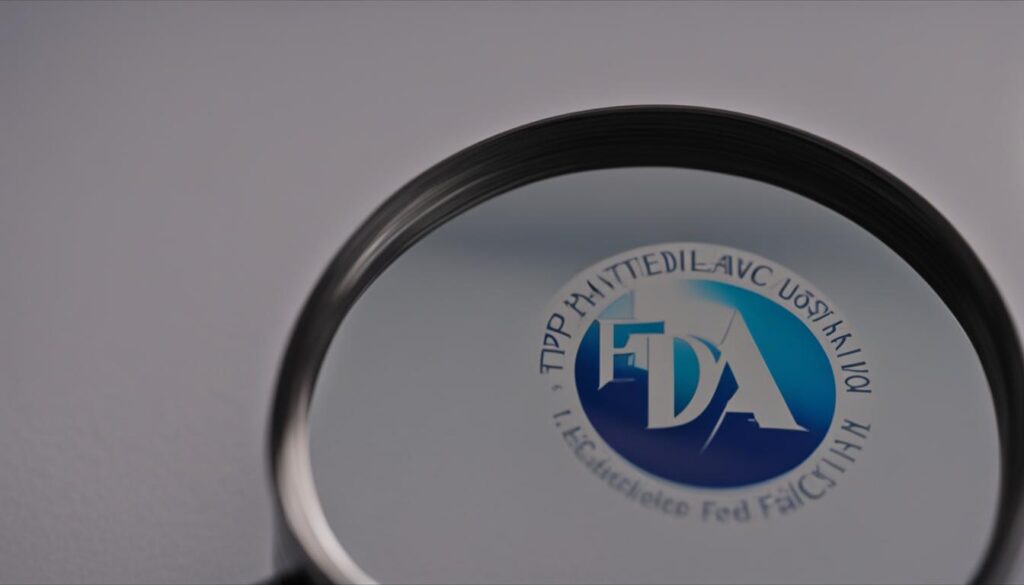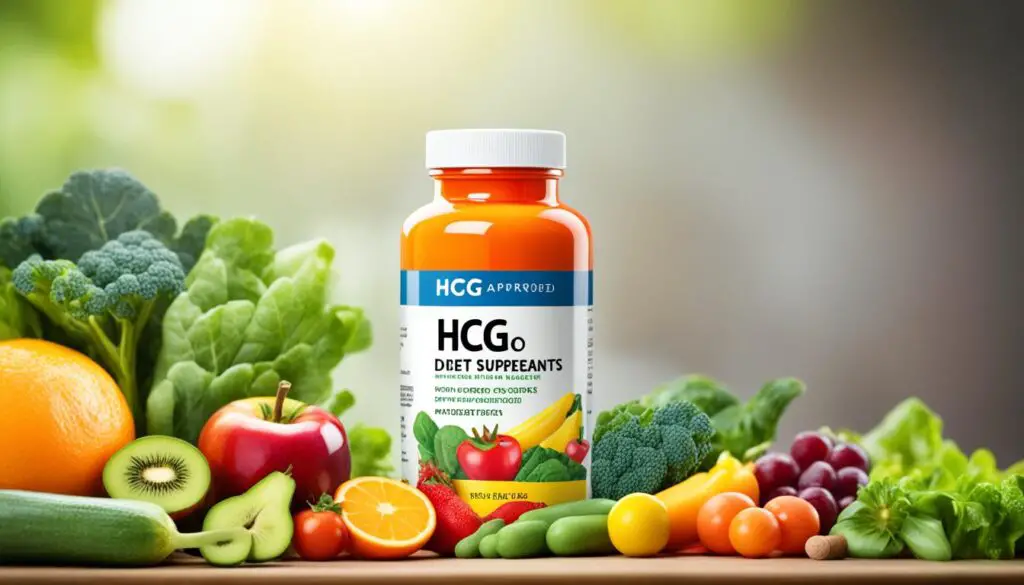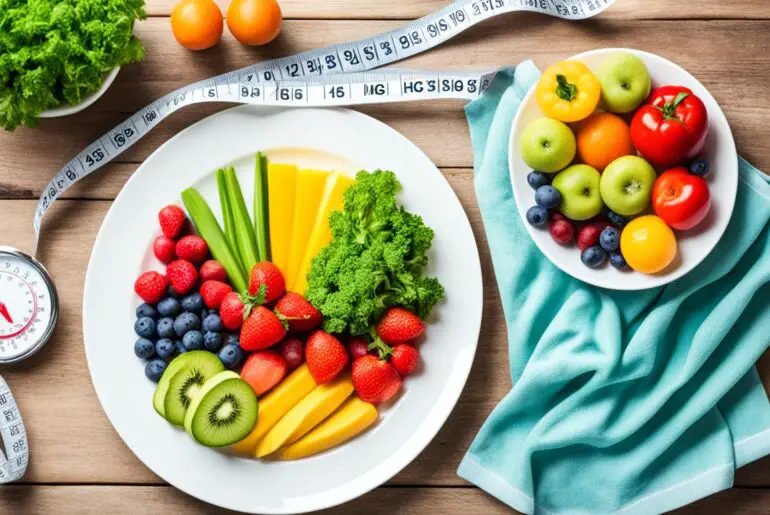Are you struggling to control your appetite and lose weight? The HCG Diet has gained popularity for its promise of rapid weight loss, but is it really effective? And more importantly, are there safer alternatives available? In this article, I will explore the truth behind the HCG Diet and reveal some approved hunger suppressants that can help you achieve your weight loss goals without compromising your health.
Key Takeaways:
- The HCG Diet claims to promote weight loss through the use of the hCG hormone, but scientific evidence does not support its effectiveness.
- There are other appetite control supplements available that are safe and effective for weight loss.
- It is important to consult with a healthcare provider for personalized guidance and recommendations before starting any weight loss program.
- Focus on long-term lifestyle changes and incorporating a balanced diet and regular exercise for sustainable weight loss.
- Seeking professional guidance is crucial to ensure safety and a more tailored approach to your weight loss journey.
The Science Behind the HCG Diet
The hCG Diet is often touted as an effective weight loss method that can reset your metabolism and lead to rapid weight loss. However, scientific research has shown that the main factor contributing to weight loss on this diet is the ultra-low-calorie intake, rather than the hCG hormone itself. Studies have revealed that any super-low-calorie diet, regardless of hCG usage, will result in weight loss.
Research has also indicated that hCG has no direct impact on weight loss. The hormone is primarily produced during pregnancy and does not play a significant role in regulating metabolism or suppressing hunger in non-pregnant individuals.
On the hCG Diet, adherents are required to limit their calorie intake to only 500 calories per day. This ultra-low-calorie diet triggers weight loss by creating a significant calorie deficit. However, such severe calorie restriction can lead to feelings of hunger and weakness as the body is not receiving sufficient nutrients and energy.
The Metabolic Myth
Despite claims that hCG can reset your metabolism, there is no scientific evidence to support this notion. While the hCG Diet may result in initial weight loss, it is primarily due to the significant calorie deficit, rather than any metabolic changes caused by hCG.
“Scientific research has shown that the main factor contributing to weight loss on this diet is the ultra-low-calorie intake, rather than the hCG hormone itself.”
The Impact of Ultra-Low-Calorie Diets
Ultra-low-calorie diets like the hCG Diet can cause various side effects, including feelings of fatigue, weakness, and irritability. The severe calorie restriction associated with the hCG Diet can deprive the body of essential nutrients and lead to nutrient deficiencies if not properly monitored.
It is important to note that while the hCG Diet may yield initial weight loss results, it is not a sustainable or healthy approach to weight management. The extreme calorie restrictions and potential nutrient deficiencies may harm your overall well-being.
FDA Approval and Safety Concerns

When considering the use of hCG diet products for appetite control, it is essential to be aware of FDA approval and safety concerns. The FDA has not approved the use of hCG for weight loss purposes. While hCG shots administered by healthcare providers are legal for treating fertility issues, over-the-counter hCG products are not approved by the FDA.
In fact, the FDA has taken action against companies selling homeopathic hCG products by issuing warning letters. These products are considered illegal and potentially unsafe for consumption. It is crucial to exercise caution and prioritize safety when exploring options for appetite control on the hCG Diet.
“The FDA has not approved the use of hCG for weight loss.” – FDA spokesperson
Before embarking on any weight loss program, it is always recommended to consult with a healthcare provider to ensure the legality and safety of the products and methods being considered. Professional guidance plays a crucial role in making informed decisions about one’s health and well-being.
| FDA Approval Status | Legal Status | Safety |
|---|---|---|
| Not approved for weight loss | Over-the-counter hCG products are not approved | Homeopathic hCG products considered illegal and potentially unsafe |
The Importance of Seeking Professional Guidance
Given the complexity and potential risks associated with the hCG Diet, it is crucial to seek professional guidance from a healthcare provider. They can provide personalized advice, explain the potential drawbacks, and recommend safer alternatives for appetite control and weight loss.
The HCG Diet Protocol
The HCG Diet protocol is a key component of the HCG diet plan. This protocol involves a strict calorie restriction of 500 calories per day while taking hCG supplements for a duration of 8 weeks. Let’s explore the meal options and guidelines for this protocol.
Meal Options
On the HCG Diet, you are allowed two meals per day. Each meal should consist of:
- One serving of protein
- One serving of vegetable
- One serving of bread
- One serving of fruit
You must ensure that you choose the right options within each category. Here are some examples of allowed food choices:
| Category | Food Options |
|---|---|
| Protein | Lean meats such as chicken breast, turkey, or white fish |
| Vegetable | Selected vegetables like spinach, lettuce, tomatoes, or cucumbers |
| Bread | Melba toast or breadsticks |
| Fruit | Approved fruits such as apples, strawberries, oranges, or grapefruit |
Beverages and Sugar Substitutes
When it comes to beverages, you are allowed to consume water, coffee, and tea while on the HCG Diet. However, it is important to limit sugar and fat intake in these drinks. You can use sugar substitutes to sweeten your beverages as an alternative.
Sample Menu
To give you a better idea of how the HCG Diet protocol can be structured, here’s a sample menu:
Breakfast: 1 serving of grilled chicken breast with a side of mixed salad greens
Lunch: 1 serving of white fish with steamed asparagus and a slice of melba toast
Snack: 1 apple
Dinner: 1 serving of turkey breast with cherry tomatoes and a breadstick
Remember to consult with a healthcare provider or a registered dietitian before starting the HCG Diet to ensure it aligns with your individual needs and health goals.
Challenges and Risks of the HCG Diet

Following such a strict calorie limit can be challenging and uncomfortable. It may also lead to nutritional deficiencies, including inadequate protein intake and insufficient vitamins and minerals. Very-low-calorie diets like the HCG Diet should be closely supervised by healthcare providers, particularly in individuals with medical conditions. It is important to ensure that the diet provides all necessary nutrients for optimal health.
Nutritional Needs on the HCG Diet
The HCG Diet’s strict 500-calorie limit poses a significant challenge in meeting essential nutritional needs. The severe calorie restriction can result in inadequate protein consumption, leading to protein deficiency. This can have detrimental effects on overall health, as proteins are essential for various bodily functions, including tissue repair and hormone production.
Furthermore, such a low-calorie diet may not provide sufficient vitamins and minerals, which are vital for maintaining proper bodily functions and overall well-being. Inadequate intake of essential nutrients like Vitamins A, E, D, K, and B vitamins, as well as essential minerals like iron, calcium, and magnesium, can lead to deficiencies and potential health complications.
Supervision and Individual Variations
Embarking on a very-low-calorie diet like the HCG Diet should not be undertaken without the proper supervision of a healthcare provider. Professional guidance is crucial in ensuring that the diet is tailored to an individual’s specific needs, taking into account their overall health, medical conditions, and nutritional requirements.
Each person’s nutritional needs may vary, and healthcare providers can help individuals create a well-balanced diet plan that meets their unique requirements, ensuring that essential nutrients are adequately provided and deficiencies are prevented. Regular monitoring and follow-up appointments are important to address any issues or concerns that may arise during the course of the diet.
Comparison of Nutritional Needs on the HCG Diet and Recommended Daily Intake*
| Nutrient | HCG Diet (500-calorie limit) | Recommended Daily Intake |
|---|---|---|
| Protein | Restrictive, may not meet daily needs | 46-56 grams for adults (varying by gender and activity level)** |
| Vitamins and Minerals | Potential deficiencies due to limited food choices | Varies depending on the nutrient |
*Based on general recommendations; individual needs may vary. Consult a healthcare provider for personalized advice.
**Source: National Institutes of Health – Recommended Daily Intake for Nutrients
“Following such a strict calorie limit can be challenging and uncomfortable. It may also lead to nutritional deficiencies, including inadequate protein intake and insufficient vitamins and minerals.”
Vegetarian and Vegan Considerations
When exploring the suitability of the HCG diet for vegetarians and vegans, there are certain considerations to keep in mind. While the diet claims to accommodate vegetarians, it may not be completely safe or optimal for individuals following a plant-based lifestyle. Here’s why:
-
Protein Sources:
For vegetarians on the HCG diet, protein sources would typically include dairy products like milk, yogurt, and cheese. However, for vegans who avoid all animal-derived products, dairy is not an option. This can pose a challenge for meeting the protein requirements of the diet.
-
Gluten-Free Concerns:
The HCG diet allows for certain types of bread as part of the meal options. However, individuals following a gluten-free diet would need to explore alternatives to ensure compliance with their dietary needs. The inclusion of bread on the HCG diet makes it unsuitable for those with gluten sensitivities or celiac disease.
Considering these dietary restrictions, it is important for both vegetarians and vegans to consult with a healthcare provider before embarking on the HCG diet. They can provide guidance on appropriate protein sources and alternatives to bread, ensuring that nutritional needs are met while aligning with specific dietary choices.
Image:
Safety Concerns and Side Effects

The HCG Diet, although popular, comes with certain safety concerns and potential side effects. It is essential to be fully aware of these risks before considering starting the diet. Consulting with a healthcare provider is highly recommended to discuss the suitability and safety of the HCG Diet for individual circumstances.
Potential Side Effects
While individuals may experience different side effects, some commonly reported ones associated with the HCG Diet include:
- Fatigue
- Irritability
- Restlessness
- Depression
- Fluid buildup
- Swelling of the breasts in men
These side effects can affect both physical and mental well-being during the course of the diet. It is important to monitor any changes closely and discuss them with a healthcare provider.
It is essential to always prioritize one’s health and well-being. If you experience severe or persistent side effects while on the HCG Diet, please seek medical attention immediately.
Concerns about Blood Clots
One of the significant concerns related to the HCG Diet is the potential risk of blood clots forming and blocking blood vessels. Blood clots can have serious health implications and should not be taken lightly. Individuals with a history of blood clotting disorders or other related medical conditions should exercise extra caution and discuss the potential risks with a healthcare provider before starting the HCG Diet.
Hunger Management Strategies on the HCG Diet

For individuals experiencing hunger on the HCG Diet, there are several strategies that may help. By incorporating these hunger management techniques, you can effectively stay on track with your weight loss goals and minimize feelings of hunger.
1. Water Intake
Drinking an adequate amount of water throughout the day can help suppress appetite. Aim to drink at least 8-10 glasses of water daily. Not only does water keep you hydrated, but it also helps create a feeling of fullness, reducing the urge to snack or overeat.
2. Coffee and Green Tea
Coffee and green tea are known for their appetite-suppressing properties. The caffeine content in these beverages can help reduce hunger pangs and increase metabolism. However, it’s essential to consume them in moderation and limit the addition of sugar or cream.
3. Meal Spacing
Experimenting with meal spacing can be helpful in managing hunger on the HCG Diet. Some individuals find success with eating smaller, more frequent meals throughout the day, while others prefer to have one large meal. Find a rhythm that works best for you and helps control your hunger levels.
4. Protein at Each Meal
Consuming an adequate amount of protein at each meal is crucial for hunger management. Protein takes longer to digest, keeping you feeling full and satisfied for a more extended period. Incorporate lean sources of protein such as chicken, fish, tofu, or beans into your meals on the HCG Diet.
5. Free Vegetables
Take advantage of the “free vegetable” options allowed on the HCG Diet. These vegetables are low in calories and high in fiber, adding bulk to your meals and providing a sense of fullness. Incorporate a variety of colorful and nutritious vegetables like spinach, broccoli, kale, and bell peppers into your daily meals.
6. Table: Hunger Management Strategies
| Strategy | Description |
|---|---|
| Water Intake | Drink 8-10 glasses of water daily to suppress appetite and stay hydrated. |
| Coffee and Green Tea | Consume coffee or green tea in moderation to reduce hunger and boost metabolism. |
| Meal Spacing | Experiment with meal spacing to find a rhythm that helps manage hunger levels. |
| Protein at Each Meal | Incorporate lean sources of protein into every meal to increase satiety. |
| Free Vegetables | Add fiber-rich and low-calorie vegetables to meals for added bulk and fullness. |
By implementing these hunger management strategies on the HCG Diet, you can optimize your weight loss journey and maintain a sense of fullness throughout the day. Remember to listen to your body’s signals and adjust your eating patterns as needed.
Safer Alternatives for Appetite Control

If appetite control and weight loss are your goals, there are safer alternatives to the HCG Diet. It’s essential to focus on long-term sustainable solutions that promote a balanced diet and regular exercise for healthy weight management.
Consulting with a healthcare provider can help you create a personalized plan that addresses your specific needs and goals. They can guide you in making informed decisions and provide expert advice on nutrition and exercise.
“A well-balanced diet and regular exercise are key factors in achieving and maintaining a healthy weight.”
Incorporating a balanced diet that includes a variety of nutrient-rich foods is crucial. Focus on consuming lean proteins, whole grains, fruits, vegetables, and healthy fats. These food choices provide essential nutrients and help keep you feeling satisfied.
To support appetite control, prioritize foods that are high in fiber and protein. Both fiber and protein can help you feel fuller for longer, reducing the tendency to overeat.
Here are some appetite-suppressing foods to consider:
- Broccoli
- Spinach
- Almonds
- Oatmeal
- Lentils
- Skinless chicken breast
- Salmon
Additionally, regular exercise plays a vital role in weight management. It not only burns calories but also improves overall fitness and helps maintain lean muscle mass. Aim for a combination of cardio exercises, such as jogging or swimming, and strength-training exercises that target different muscle groups.
Benefits of a Balanced Diet and Regular Exercise
Adopting a balanced diet and regular exercise routine offers numerous benefits beyond just weight loss and appetite control. Some of these benefits include:
- Improved cardiovascular health
- Increased energy levels
- Enhanced mood and mental well-being
- Reduced risk of chronic diseases
- Stronger immune system
- Better sleep quality
No single diet or exercise regimen works for everyone. It’s crucial to find an approach that suits your preferences, lifestyle, and health needs. Working with a healthcare provider ensures that you receive personalized guidance and support throughout your weight loss journey.
Remember, the key to long-term success lies in making sustainable lifestyle changes. Focus on nourishing your body with wholesome foods, staying active, and seeking professional guidance along the way.
The Importance of Professional Guidance

When it comes to embarking on any weight loss program, including the HCG Diet, seeking professional guidance from a trusted healthcare provider is crucial for your safety and success. A healthcare provider can provide the expertise and personalized recommendations needed to navigate through your weight loss journey.
With their professional guidance, healthcare providers can assess your specific needs and health status to create a tailored approach that fits your individual circumstances. They can consider factors such as your medical history, current medications, and any underlying health conditions to ensure that the weight loss program is safe and effective for you.
Choosing to work with a healthcare provider provides a personalized approach, taking into account your unique circumstances, goals, and preferences. They can offer valuable advice on which weight loss strategies are most suitable for you, such as dietary modifications, exercise routines, and behavior change techniques.
Moreover, healthcare providers can monitor your progress and make adjustments as needed. They can track your weight loss, assess any potential side effects or complications, and make necessary modifications to your plan to optimize your results.
By seeking professional guidance, you can have peace of mind knowing that you are under the care of a qualified healthcare provider who is equipped with the knowledge and expertise to guide you through your weight loss journey safely and effectively.
Remember, your health and well-being are paramount, so consulting with a healthcare provider should always be the first step before embarking on any weight loss program.
Table:
| Benefits of Professional Guidance | Reasons to Consult a Healthcare Provider |
|---|---|
| Personalized Approach: Tailored recommendations based on your needs and health status. | Safety: Ensures your weight loss journey is safe and minimizes potential risks. |
| Expertise: Access to the expertise of healthcare professionals who specialize in weight loss and nutrition. | Optimal Results: Professional guidance can optimize your weight loss results and help you achieve your goals. |
| Monitoring and Support: Ongoing monitoring of your progress and adjustment of your plan as needed. | Individualized Advice: Recommendations tailored to your unique circumstances, goals, and preferences. |
Conclusion
After examining the scientific evidence, it is clear that while the HCG Diet has gained popularity, it lacks effectiveness in promoting sustainable weight loss. Fortunately, there are safer and proven alternatives available for appetite control and healthy weight management.
When aiming to achieve safe weight loss, it is crucial to make informed and healthy choices. Instead of resorting to drastic calorie restrictions and unproven methods, individuals should focus on long-term lifestyle changes that include a balanced diet and regular exercise.
Seeking professional guidance from a healthcare provider is essential on any weight loss journey. They can provide personalized recommendations based on individual needs and health status. Professional guidance ensures safety and a more tailored approach to achieving weight loss goals.
FAQ
Are there appetite control supplements approved for the HCG Diet?
Yes, there are appetite control supplements available that are approved for use on the HCG Diet. These supplements can help suppress hunger and cravings, making it easier to adhere to the low-calorie diet.
Can natural appetite suppressants be used for weight loss?
Yes, natural appetite suppressants can be effective for weight loss. These supplements are usually made from plant-based ingredients and can help reduce hunger and increase feelings of fullness.
What are some effective appetite suppressants for weight loss?
Some effective appetite suppressants for weight loss include glucomannan, garcinia cambogia, green tea extract, and conjugated linoleic acid (CLA). These supplements can help reduce hunger and support healthy weight management.
Are there appetite suppressants specifically designed for the HCG Diet?
Yes, there are appetite suppressants available that are specifically designed for the HCG Diet. These supplements are formulated to help control hunger while following the low-calorie diet protocol.
Can I use appetite suppressants for the HCG Diet without a prescription?
Yes, appetite suppressants for the HCG Diet are typically available without a prescription. However, it is important to consult with a healthcare provider before starting any new supplement to ensure safety and efficacy.
What are the best hunger suppressants for the HCG protocol?
Some of the best hunger suppressants for the HCG protocol include supplements that contain ingredients like 5-HTP, African mango extract, and raspberry ketones. These ingredients can help control appetite and support weight loss on the HCG Diet.
Are there appetite suppressants that are safe for healthy weight loss?
Yes, there are appetite suppressants available that are safe for healthy weight loss. These supplements are typically made from natural ingredients and can be used as part of a balanced diet and exercise regimen.
Can appetite suppressants be used on the HCG Diet?
Yes, appetite suppressants can be used on the HCG Diet to help control hunger and cravings. However, it is important to choose appetite suppressants that are approved for use with the HCG Diet and consult with a healthcare provider before starting any new supplement.
What are the top hunger suppressants for rapid weight loss?
Some of the top hunger suppressants for rapid weight loss include supplements that contain ingredients like caffeine, green tea extract, and cayenne pepper. These ingredients can help increase metabolism and control hunger, leading to faster weight loss.
Can I use appetite suppressants while on the HCG Diet without a prescription?
Yes, there are appetite suppressants available for use on the HCG Diet that do not require a prescription. However, it is still important to consult with a healthcare provider before starting any new supplement to ensure safety and efficacy.




